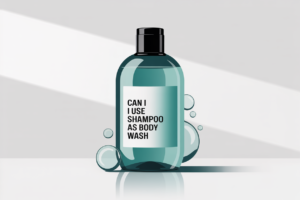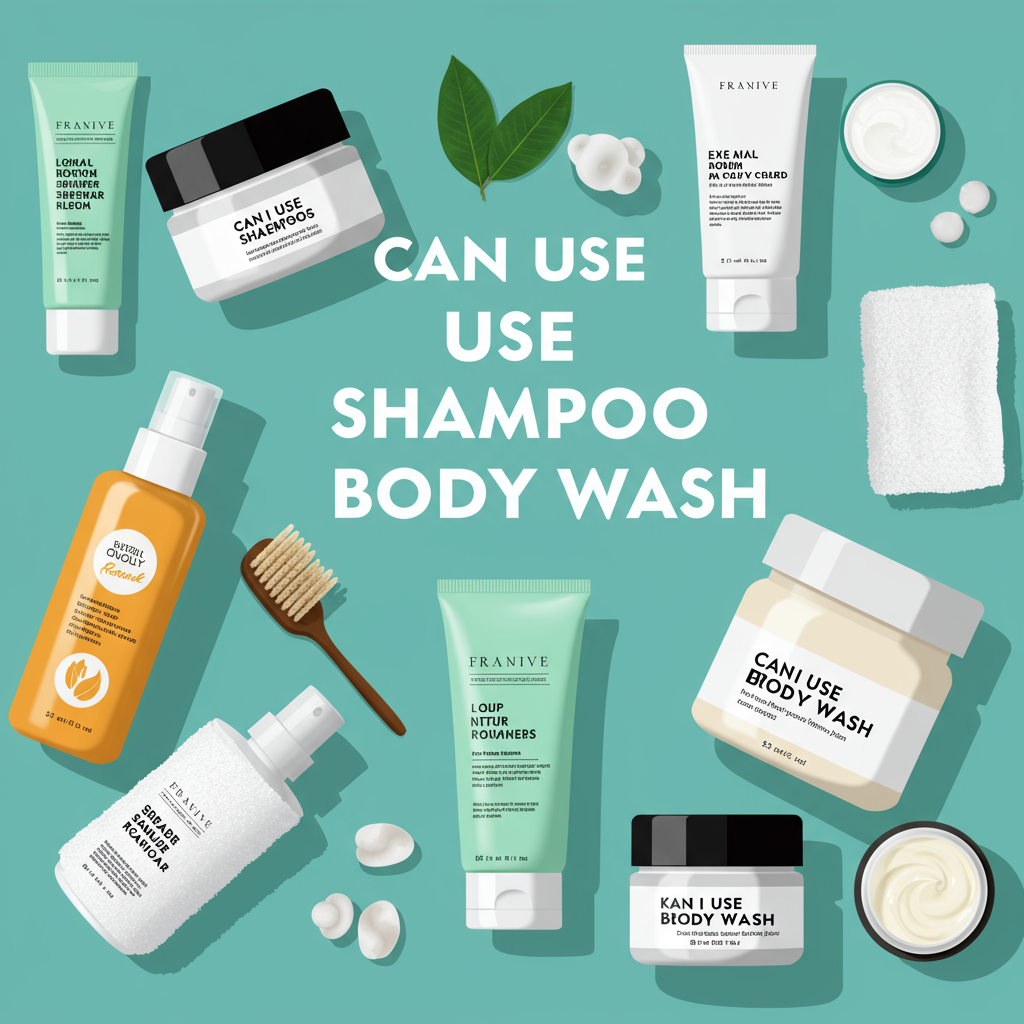We’ve all been there. You step into the shower, ready for a refreshing cleanse, only to realize your body wash bottle is completely empty. Your eyes dart to the shampoo, sitting there, full and beckoning. A common question immediately pops into your mind: “Can I use shampoo as body wash?” It’s a tempting shortcut, especially when you’re in a rush, traveling light, or simply trying to simplify your routine. But is it truly safe and effective for your skin? Or could this quick fix lead to unforeseen consequences?

This isn’t just about convenience; it’s about understanding the fundamental differences between products designed for your scalp and hair versus those formulated for your delicate body skin. While both shampoo and body wash are cleansers, their specific compositions, pH levels, and intended purposes vary significantly. Using a product outside its intended application can have a direct impact on your skin’s health, hydration, and overall appearance.
In this comprehensive guide, we’ll dive deep into the science behind these common bathroom staples. We’ll explore the key distinctions in their ingredients and formulations, weigh the pros and cons of using shampoo on your body, and provide practical advice on when it might be acceptable (and when it’s definitely not). By the end, you’ll have a clear understanding of whether you can safely use shampoo as body wash, empowering you to make informed decisions for a healthier, happier skin and hair care routine.
Understanding the Core Question: Can I Use Shampoo As Body Wash?
The immediate answer to “Can I use shampoo as body wash?” is often a nuanced “yes, but with caution.” In a true pinch, for a one-off emergency, using shampoo to cleanse your body won’t likely cause catastrophic harm. However, this convenience comes with potential trade-offs, especially if it becomes a regular habit. The primary reason for this careful approach lies in the distinct design and purpose of each product.

Shampoo is meticulously crafted to cleanse your hair and scalp, targeting oil, dirt, and product buildup while also addressing specific hair concerns like dryness, oiliness, or frizz. Body wash, on the other hand, is formulated to clean the skin on your body, focusing on removing impurities without stripping its natural moisture barrier. These different objectives lead to significant variations in their chemical compositions.
Many people consider using shampoo on their body for various reasons:
- Travel: To minimize bottles in luggage.
- Emergency: When body wash runs out unexpectedly.
- Simplicity: Trying to streamline their shower routine.
- Cost-saving: Believing one product can do the job of two.
Understanding these motivations is key to providing practical advice on navigating this common bathroom dilemma.
The Fundamental Differences Between Shampoo and Body Wash
While both shampoo and body wash are designed to clean, their underlying formulations are tailored to the specific needs of hair, scalp, and skin. Ignoring these differences can lead to suboptimal results or even irritation. Let’s break down what sets them apart.
Purpose and Formulation
- Shampoo: Primarily formulated for your hair and scalp. Its main goals are to remove excess oil (sebum), dirt, dead skin cells, and styling product residue from your hair fibers and scalp. Shampoos often contain ingredients that aim to open the hair cuticle (for deep cleansing) or smooth it (for conditioning), and they might include specific actives for hair growth, anti-dandruff properties, or color protection.
- Body Wash: Designed for the skin on your body. The skin on your body has a different texture, oil gland distribution, and sensitivity compared to your scalp. Body washes focus on gentle cleansing, moisturizing, and maintaining the skin’s natural barrier. They often contain humectants and emollients to prevent dryness and leave the skin feeling soft and hydrated.
Ingredients Breakdown
The ingredient list is where the true distinctions lie. While some ingredients overlap, their concentrations and specific types differ significantly.
Surfactants (Cleansing Agents)
- Shampoo: Often contains stronger surfactants like Sodium Lauryl Sulfate (SLS) or Sodium Laureth Sulfate (SLES). These create abundant lather and are highly effective at stripping away oils and dirt from hair, which can sometimes be too harsh for sensitive body skin.
- Body Wash: Tends to use milder surfactants, such as Cocamidopropyl Betaine, Sodium C14-16 Olefin Sulfonate, or Disodium Laureth Sulfosuccinate. These still cleanse effectively but are less likely to strip the skin’s natural oils, helping to maintain its moisture barrier.
pH Levels
- Shampoo: Typically has a pH range of 4.5 to 5.5, which is slightly acidic. This pH is ideal for closing the hair cuticle, making hair look shinier and less prone to frizz.
- Body Wash: Formulated to be closer to the natural pH of healthy skin, which is around 5.5. Maintaining this slightly acidic “acid mantle” is crucial for skin barrier function and protection against bacteria and environmental stressors. Using a shampoo with a lower pH on your body might disrupt this balance.
Moisturizers and Conditioners
- Shampoo: Some shampoos (especially “2-in-1” or moisturizing types) contain conditioning agents like silicones (e.g., dimethicone) or oils. While beneficial for hair, these can sometimes leave a residue on the skin, potentially clogging pores for some individuals.
- Body Wash: Frequently enriched with moisturizing ingredients such as glycerin, ceramides, hyaluronic acid, shea butter, or various botanical oils. These are specifically included to hydrate the skin during and after washing, counteracting the drying effects of cleansing.
Other Additives
- Shampoo: May contain ingredients targeting specific hair concerns, such as anti-dandruff agents (e.g., zinc pyrithione, salicylic acid), volumizers, or color-protecting compounds, which are not designed for skin.
- Body Wash: Might include exfoliating beads, antibacterial agents, or specific fragrances designed for a sensory experience on the skin.
The Pros of Using Shampoo as Body Wash (When It’s Okay)
While not ideal for regular use, there are specific situations where using shampoo on your body might offer some advantages:
- Emergency Convenience: This is the number one reason. If you’re traveling, at the gym, or simply ran out of body wash, shampoo can serve as a temporary cleanser to remove dirt and sweat. It’s certainly better than no wash at all!
- Minimalist Travel: For light packers, consolidating products can be a huge benefit. A single bottle of shampoo can cover hair and body cleansing for a short trip, reducing luggage weight and space.
- Cost-Effective (in the short term): If you already have shampoo on hand and don’t want to buy a separate body wash for a specific, temporary need, it saves a few dollars.
- Gentle Shampoos for Mild Cleansing: If you happen to use a very gentle, sulfate-free, fragrance-free, or “baby” shampoo, it might be mild enough for your body skin without causing significant irritation, especially if your skin isn’t particularly sensitive.
In these scenarios, the “pros” are primarily about practicality and immediate need rather than long-term skin health benefits.
The Cons and Potential Risks of Using Shampoo as Body Wash
Despite the convenience, using shampoo as body wash regularly can lead to several undesirable outcomes for your skin.
- Skin Dryness and Irritation: Many shampoos contain stronger surfactants designed to strip oil from hair. These can also strip the natural oils (sebum) from your skin, leading to dryness, tightness, flakiness, and even itching. Your skin’s natural moisture barrier can be compromised.
- Acne and Breakouts: The conditioning agents (like silicones) or heavier oils found in some shampoos, while great for hair, can be occlusive for skin. This means they can potentially clog pores, leading to body acne (bacne) or breakouts, especially on the back, chest, or shoulders.
- Allergic Reactions and Sensitivity: Shampoos often contain higher concentrations of fragrances, dyes, and other additives that can be irritating or allergenic to sensitive skin. These ingredients might be tolerated on the scalp but can cause redness, rash, or contact dermatitis when applied to larger areas of the body.
- Residue Build-up: Shampoos are formulated to rinse cleanly from hair, but some ingredients might leave a subtle film on the skin, leading to a “not-quite-clean” feeling or even stickiness.
- pH Imbalance: As mentioned, shampoo’s pH is optimized for hair. Using a product with a pH significantly different from your skin’s natural slightly acidic mantle can disrupt its protective barrier, making it more vulnerable to bacteria, environmental damage, and moisture loss.
- Exacerbation of Skin Conditions: If you suffer from conditions like eczema, psoriasis, or very dry skin, using shampoo on your body can severely worsen symptoms, causing increased dryness, irritation, and flare-ups.
These cons highlight why dedicated body wash products are formulated the way they are – to nurture and protect your skin.
When to Absolutely Avoid Using Shampoo as Body Wash
While the occasional use might be tolerable for some, there are definite scenarios where you should never use shampoo as body wash due to the high risk of adverse reactions:
- Sensitive Skin: If your skin is prone to redness, itching, or irritation from various products, steer clear. Shampoos are generally too harsh.
- Dry Skin Conditions: Individuals with eczema, psoriasis, or extremely dry skin will likely experience significant worsening of their condition due to the stripping nature of many shampoos.
- Acne-Prone Skin: If you frequently experience body acne, using shampoo can introduce pore-clogging ingredients or harsh cleansers that exacerbate breakouts.
- Strong or Medicated Shampoos: Shampoos designed for specific treatments (e.g., anti-dandruff, clarifying, medicated) often contain potent active ingredients that are far too strong or inappropriate for use on general body skin. These could cause severe dryness, burning, or allergic reactions.
- Regular, Long-Term Use: Even if you don’t have overtly sensitive skin, consistent use of shampoo as body wash will likely lead to cumulative damage, resulting in chronic dryness, irritation, and a compromised skin barrier over time.
Tips for Using Shampoo as Body Wash (If You Must)
If you find yourself in a situation where you absolutely must use shampoo on your body, here are some tips to minimize potential harm:
- Choose Wisely: Opt for the mildest shampoo you have. Look for labels like “gentle,” “sulfate-free,” “fragrance-free,” or “for sensitive scalp.” Baby shampoos are often a safer bet due to their milder formulations.
- Patch Test: If you have time, apply a small amount of shampoo to a discreet area of your skin (like your inner arm) and wait for a few minutes to see if any irritation occurs.
- Use Sparingly: You don’t need a large amount. A small dollop should be sufficient to create a light lather and cleanse your body.
- Lather in Hands First: Instead of applying directly to your skin, lather the shampoo in your hands with a little water first. This helps to dilute it slightly and activate the cleansing agents before it touches your skin.
- Rinse Thoroughly: This is crucial. Ensure you rinse every trace of shampoo off your body. Any residue left behind can be irritating or pore-clogging. Spend extra time under the water.
- Moisturize Immediately: After your shower, pat your skin dry and apply a rich, hydrating body lotion or cream while your skin is still slightly damp. This helps to replenish any moisture that might have been stripped away.
Long-Term Implications: Why Dedicated Products Matter
While the occasional use of shampoo as body wash might seem harmless, consistently relying on it can have long-term negative effects on your skin’s health. Your skin is your body’s largest organ and its first line of defense against the environment. Maintaining its integrity and moisture barrier is paramount.
Using products specifically formulated for your body ensures that your skin receives the appropriate balance of cleansing and hydration. Body washes are designed to cleanse effectively without stripping essential oils, often incorporating emollients and humectants that actively nourish the skin. They are pH-balanced for the body’s skin and typically contain milder surfactants, reducing the risk of irritation, dryness, and allergic reactions.
Investing in separate, high-quality shampoos and body washes tailored to your specific hair and skin needs is a proactive step towards better overall hygiene and well-being. It allows each product to perform its intended function optimally, leading to healthier hair and happier skin in the long run. Think of it as specialized care: you wouldn’t use dish soap to wash your car, and similarly, your skin and hair benefit from their own dedicated cleaning agents.
Recommended Products
To help you maintain optimal hair and skin health, here are some product suggestions that focus on gentle cleansing and effective moisturizing, ensuring you won’t have to wonder “Can I use shampoo as body wash?” in a pinch:
CeraVe Hydrating Body Wash
A gentle, fragrance-free body wash formulated with ceramides and hyaluronic acid to cleanse and moisturize dry, sensitive skin without stripping.
Aveeno Daily Moisturizing Body Wash
Infused with soothing oat, this body wash gently cleanses while helping to replenish skin’s natural moisture, suitable for normal to dry skin.
Vanicream Moisturizing Cream
A non-comedogenic, fragrance-free moisturizer perfect for sensitive, dry, or eczema-prone skin, ideal for post-shower hydration.
Dr. Bronner’s Pure-Castile Liquid Soap – Baby Unscented
A highly versatile, concentrated soap that can be diluted for various uses, including a gentle body wash, known for its pure ingredients. (Note: always dilute for body use).
Frequently Asked Questions About Using Shampoo as Body Wash
Q1: Is it bad to use shampoo as body wash every day?
Yes, it is generally not recommended to use shampoo as body wash every day. Shampoos are formulated with stronger cleansing agents and specific pH levels optimized for hair and scalp, not the more delicate skin on your body. Daily use can strip your skin of its natural oils, leading to dryness, irritation, itching, and potentially disrupting your skin’s protective barrier. Over time, this can lead to chronic skin issues like exacerbated eczema or body acne.
Q2: What’s the main difference between shampoo and body wash ingredients?
The main differences lie in their surfactants (cleansing agents), pH levels, and moisturizing components. Shampoos often use stronger surfactants (e.g., SLS) for effective hair degreasing and have a slightly more acidic pH (4.5-5.5) to seal hair cuticles. Body washes typically employ milder surfactants, are pH-balanced closer to skin’s natural 5.5, and contain more emollients and humectants (e.g., glycerin, ceramides) to hydrate and protect the skin barrier during cleansing.
Q3: Can I use conditioner as body wash?
No, you should avoid using conditioner as body wash. Conditioner is designed to soften, detangle, and moisturize hair, often containing heavy conditioning agents like silicones and oils. These ingredients are not meant for skin and can leave a greasy residue, clog pores, and potentially cause breakouts or irritation on your body. It would not effectively cleanse your skin and would likely leave it feeling heavy and sticky rather than clean.
Q4: What should I do if my skin feels dry after using shampoo as body wash?
If your skin feels dry, tight, or itchy after using shampoo as body wash, the first step is to moisturize immediately and generously. Apply a rich, fragrance-free body lotion or cream to damp skin after your shower to help replenish lost moisture. In the future, switch back to a dedicated, hydrating body wash and ensure you’re drinking enough water. If irritation persists, consider a gentle, soothing balm and consult a dermatologist if symptoms are severe or long-lasting.
Q5: Are there any 2-in-1 shampoo and body wash products that are safe for both?
Yes, there are legitimate 2-in-1 shampoo and body wash products that are safe and effective. These products are specifically formulated to be gentle enough for both hair and skin, often using milder surfactants and balancing pH for dual compatibility. They are commonly found in baby product lines or travel-friendly options. When choosing one, look for “hypoallergenic,” “dermatologist-tested,” and “tear-free” labels, and check reviews to ensure it performs well for both hair and body.
Conclusion: The Smart Choice for Your Skin and Hair
So, can I use shampoo as body wash? The definitive answer is: yes, in a pinch, but it’s far from ideal for regular use. While a one-time emergency substitution won’t likely harm you, making it a habit can lead to dryness, irritation, clogged pores, and a compromised skin barrier. The fundamental differences in formulation, pH levels, and ingredient concentrations between shampoo and body wash mean each product is meticulously designed for its specific purpose.
Your hair and skin have distinct needs, and respecting those differences is key to maintaining their health and vitality. Shampoos are formulated to cleanse hair and scalp, potentially stripping body skin of essential moisture. Body washes are crafted to gently cleanse and hydrate your skin, protecting its delicate acid mantle.
Ultimately, the smartest choice for your personal care routine is to invest in separate, high-quality products that cater specifically to your hair and skin types. This ensures optimal cleansing, proper hydration, and long-term health for both. So, the next time you’re in the shower and eyeing that shampoo bottle, remember the “why” behind dedicated products and treat your skin to the specialized care it deserves.
“`

4 thoughts on “Can I Use Shampoo As Body Wash – Beauty Made Simple”